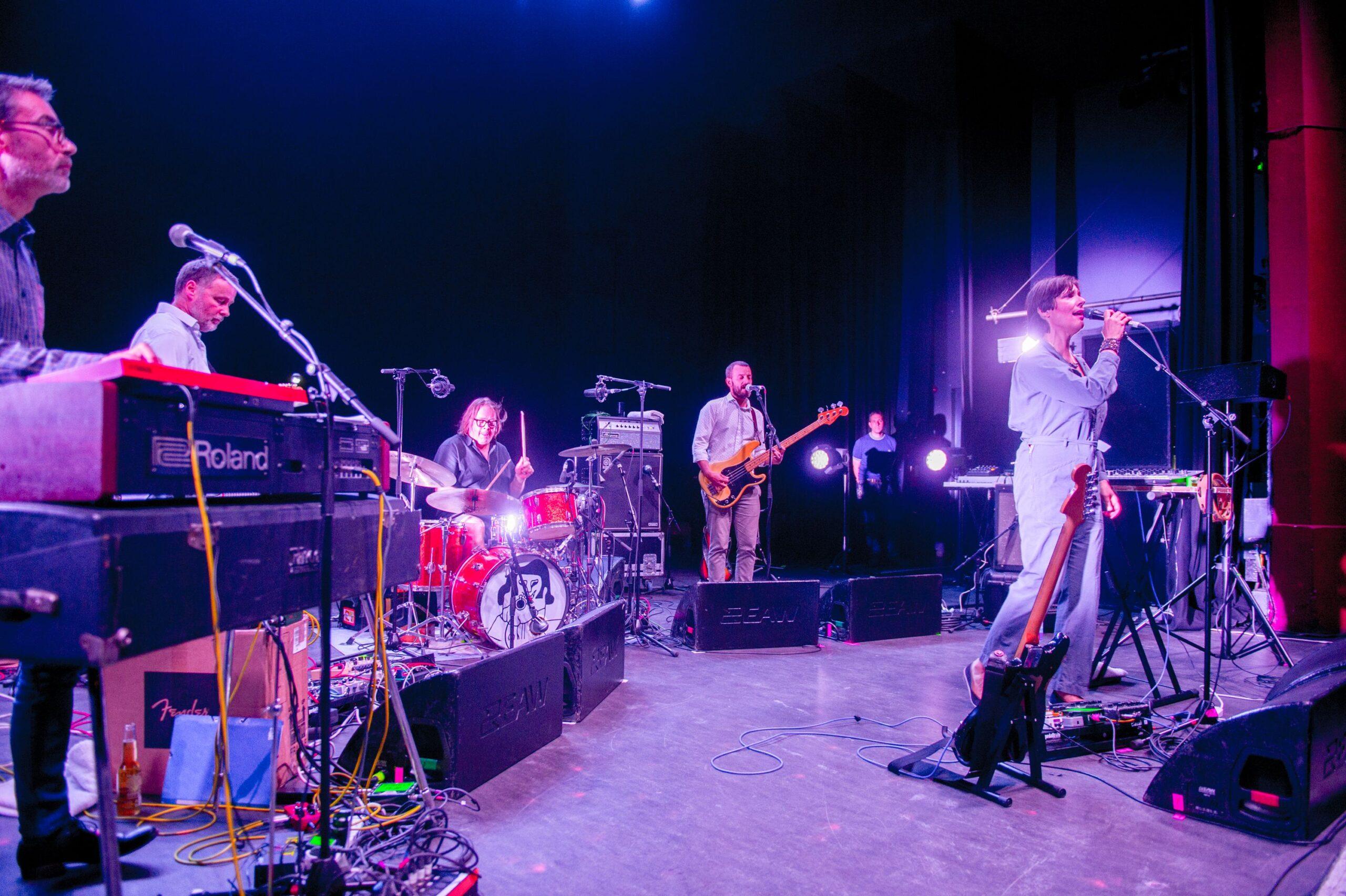Connecting All the Dots and Loops
Stereolab, the British avant-garde pop band that thrilled audiences throughout the ’90s and early ’00s, has returned. But don’t expect a nostalgia cash grab.“You remember,” Stereolab singer and cofounder Laetitia Sadier announced in a vibrant deadpan, midway through her reunited band’s nonchalantly triumphant set Saturday afternoon in Chicago as part of the Pitchfork Music Festival. “The seventh track on the 17th album. It’s not a hit. It’s called ‘Infinity Girl.’ So let’s attempt.”
She was joking: “Infinity Girl” is the sixth song on the sixth album. (Not counting compilations or EPs.) “It’s not a hit” is fair: That album, from 1999, is a bubbly and polarizing avant-jazz odyssey called Cobra and Phases Group Play Voltage in the Milky Night. “Let’s attempt” is, of course, a bit of cheeky false modesty, given the aplomb with which the five-piece band attacked the song, twee and funky, feather-light and yet head-spinningly dense. (The chorus, such as it is, consists of Sadier intoning, “Scatter / Scatter-brained by / The sins / Sins of silence,” with her singularly bubbly sort of gravity.) The packed Union Park crowd bopped along to it regardless, cheerfully oblivious to the mud, to the apocalyptic thunderstorm that had forced the park’s temporary evacuation a few hours earlier, to the sonic density, to the whole not-a-hit thing.
As for “you remember,” given the roars that greeted Stereolab all weekend as the band played its first two American shows in more than a decade, let’s take that as a given.
Friday at this year’s Pitchfork Festival was Hilariously Stifling Heat Day, one’s delight at watching Haim cover Paula Cole’s ’90s totem “I Don’t Want to Wait” harmonizing nicely with one’s dismay at having by that point sweated out two-thirds of one’s body weight. Robyn headlined on Sunday, which made Sunday Robyn Fuckin’ Rules Day. Whereas Saturday was Eerie Nostalgia Day, and a vivid demonstration of how briskly adventurous music festivals can scramble the very notion of time, unifying previously quite disparate genres, and audiences, and whole eras.

Specifically, the Isley Brothers, titans of soul, R&B, doo-wop, and that old-time rock ’n’ roll, headlined, as part of literally their 60th-anniversary tour; they were immediately preceded by immortal sad-indie darlings Belle & Sebastian, playing their twee and much less funky 1996 record If You’re Feeling Sinister in full. What a confounding thrill it was to watch basically the exact same crowd wild out to both “The Stars of Track and Field” and “Shout.”
Earlier that afternoon, the masses likewise thrilled to Stereolab’s “French Disko,” an early-’90s garage-pop call to arms, all grimy joy and stormy pathos, that kicks off with Sadier singing “Though this world’s essentially an / Absurd place to be living in / Doesn’t call for bubble withdrawal.” The chorus, the simplest and purest of the band’s three-decade career, is a group chant of “La résistance!”
Stereolab, cofounded in London by Sadier and guitarist Tim Gane in 1990, put out 10 full-length albums (from 1992’s Peng! to 2010’s Not Music) and, as aforementioned, roughly 10 billion EPs and comps and singles, as fearsome and perplexing and rewarding a catalog as you’ll find in the Western canon. The band’s sound has sprawled defiantly from pummeling rock drones to arty electronic squeals, from searing leftist societal critique to the fizzy ba-ba-ba precociousness of French pop, from jazz to funk to experimental noise, from Brazil to Germany to Mars. But the from ______ to ______ construction never really sufficed; the Stereolab experience is all that stuff radically combined, everything hitting at once, provoking both deep thought and its blissful opposite.
What a thrill it was, then, to watch the band kick off its Pitchfork set with the avant-garde jam “Come and Play in the Milky Night,” with its tricky rhythm and nimble bassline and keyboards-as-birdsong trills, and to notice a little baby bouncing happily on his dad’s shoulders just as the guitar distortion kicked in. What a hoot to watch a dude in pink shorts and a soaked T-shirt advertising Chicago post-punk band Negative Scanner, with a bucket hat and sunglasses and smears of sunscreen whiting up his beard and a can of rosé sweating in his hand, pogoing joyously to a sci-fi-disco inferno called “Miss Modular.” What a thrill to watch it all peak with a song called “Lo Boob Oscillator,” a Velvet Underground–to–Kraftwerk Homeric epic sung by the Vincennes-born Sadier in lilting French and delivered to a raucous festival crowd as, well, a raucous festival anthem.
“We never were really a festival band,” Gane told me the previous afternoon, sipping a nonalcoholic beer on the sweltering patio of his hotel as Duran Duran blared over the sound system. “I don’t think we’re a festival band. We’re not, like, crowd-pleasers. We’re not like, Hey, how you all doing? and all that stuff.” That’s not quite false modesty: Stereolab have never much gone in for pandering, for cheap heat, for nostalgia. They have always been fluent in genres and visual styles and philosophies years if not decades past, but the result always sounds like them, and sounds like now. Even now. Especially now.
“I wanted to play so that you wouldn’t need to know the songs before,” Gane said. “So it’s quite important that it does come across even if people don’t know us. That we’re not just only about people who are familiar with our stuff pretty well and had seen us before and remembering. I mean, we’re not interested in that whatsoever. No one’s interested in that. No nostalgia. None of that stuff.”
If anyone can reunite without getting bogged down in stultifying reunion-type sentimentality, it’s Stereolab, whose full catalog is rewarding less in the sense that you might one day fully wrap your head around it, and more in the sense that there’s a singular ecstasy to realizing that you never will. It’s a fine time to get acquainted, or reacquainted, and to make peace with the fact that the thrill, as always, is in the attempt.
Just start somewhere, start anywhere. Start with, let’s say, “Les Yper-Sound,” off the band’s fourth and most immediately accessible record, 1996’s Emperor Tomato Ketchup, a bona fide pop song that sounds like 12 different alien abductions taking place simultaneously over spy-movie bass and Sadier’s calm, sonorous warnings against division and tribalism: “Make ’em opposites / So there’s a reason / Stigmatization / OK, now we can fight.” As we see here in a vintage Later … With Jools Holland performance, the more keyboards, and the more tambourine, the better, always.
Stereolab, in conjunction with a world tour that brings them back stateside for headlining gigs starting in mid-September, is remastering and reissuing the bulk of their catalog on streaming services, on CD, but most importantly, in impossibly luxe triple-LP vinyl packages full of extras that, in a rarity among even other artists’ most celebrated reissues, add to the album’s narrative without merely adding to its bulk. (Or its price.) “For us personally, and for a certain core of fans, the music really does exist for the vinyl recording and the whole package and everything that goes with it,” Gane said. “And we wanted to be as attentive to all that as we ever were.”
I don’t think we’re a festival band. We’re not, like, crowd-pleasers.Tim Gane
This endeavor began in early May with new versions of 1993’s Transient Random-Noise Bursts With Announcements and 1994’s Mars Audiac Quintet, two of the group’s earliest and crunchiest records, the alt-rock snarls undercut by mesmerizing organ moans. The Transient extras include multiple sketches of the 18-minute powerhouse “Jenny Ondioline,” one of the band’s most hypnotic and electrifying tunes; Mars Audiac Quintet includes a startling demo version of a song called “Transporté Sans Bouger” slowed down and prettified and reduced to voice and guitar and Sadier’s voice, a rare glimpse at the rock-solid foundation necessary to sustain the band’s trademark complexity. (“Transporté Sans Bouger” is, unfortunately, also a very embarrassing song title to try to pronounce while sitting across a table from Tim Gane.)
“Three-Dee Melodie,” the opening track off Mars Audiac Quintet, is another excellent one-song starting point, if only for the way longtime singer and guitarist (and tambourinist) Mary Hansen delivers the platonic ideal of a Stereolab chorus, a philosophical broadside disguised as a delicate lullaby: “The meaning of existence / Can’t be supplied by religion or ideology.” It’s also quite startling and beautiful, although, for longtime fans of the band, it can hurt to hear Hansen’s voice so sweetly, so plainly.
Stereolab’s lineups beyond Gane and Sadier (a longtime romantic couple who have a son, Alex, but split up in the early 2000s) have always fluctuated wildly: so many keyboards, and keyboardists to play them. But Hansen was a constant throughout the band’s golden era, which continued with the increasingly slicker and squigglier and more electronic records—1996’s Emperor Tomato Ketchup, 1997’s Dots and Loops, and 1999’s Cobra and Phases Group—that’ll be released in remastered versions in September. Hansen died in a traffic accident in 2002; she was 36. Stereolab made three more full-lengths without her, all excellent, but none quite as vital as what had come before. Listening hard to the band now, Hansen’s voice jumps out at you, even when it’s just via the ba-ba-ba’s in the background. As for the reunion-tour setlists, “There were one or two songs which were just not possible to play,” Gane said, “because Mary is not alive anymore to sing them.”
Dots and Loops is regarded by many (including Pitchfork) as Stereolab’s single-album masterpiece, though Gane, at least at first, disagreed: “I thought it was too smooth. There was something about that that I didn’t like.” Indeed, if you’ve a low tolerance for, say, vibraphone—as provided by Chicago post-rock luminary John McEntire, who produced Dots and Loops and several other Stereolab albums—a song like the album opener “Brakhage” can come off a bit precious or frictionless. It’s a beautiful, gleaming monolith; it’s all a question of how monolithic, exactly, you find it.
What Gane prizes in particular is intensity; the word primitive is not often associated with his band, but he maintains it’s a notion crucial to what everyone loves about his band. “I don’t want them just to appear as quite nice, possibly reasonably well-written songs,” he says of Stereolab’s current shows. “Let’s take that as a given. But it’s in the interaction of all the players, and the sounds, and the intensity. And this has to be kept really hard-wired up. It’s like, wound up. It’s just really important that it doesn’t drift into a nice presentable pop tune.”
Gane knows that for many critics and even fans, a nice presentable pop tune is Stereolab’s stock-in-trade. “I know we have a reputation to be a little bit easy-listening and so on, and on those types of songs, we’re fine if it’s laid-back or whatever,” he noted. “That’s kind of a little bit of an illusion, I think. Certainly live.” Later in the conversation, he added, “We used to have a reputation, particularly in England, for always sounding the same, and so it depends. We did try to change. But naturally so, not artificially so. And there’s a limit to what, being the main songwriter of the basic music—I can only do what I’m capable of doing. I can’t suddenly write like Prince, even if I wanted to. Which I don’t.”
(Gane’s longtime manager, Martin Pike, sitting at the table with him, smiles.)
It’s just really important that it doesn’t drift into a nice presentable pop tune.Tim Gane
But the live 2019 version of “Brakhage”—as delivered by a lineup rounded out by bassist Xavier Muñoz Guimera, keyboard player Joe Watson, and drummer Andy Ramsay—is a different beast entirely, and a beast in general, a physical marvel that makes plain the sweat and exertion it takes to make this music sound so slick and effortless. On Friday, the night before the band’s Pitchfork set, Stereolab played a late, sold-out club gig at Chicago’s Thalia Hall, in front of a rapturous crowd that for 90 minutes shouted out various words of encouragement and, well, rapture: “We’ve missed you!” “Sounds good!” “Welcome back!” “Shake your asses, motherfuckers!” “I love you all!!”
There was a lusty, conquering-hero aspect to all the applause, and a newfound ferocity to the band being applauded. “Crest,” an early rocker with one of the rowdier and angrier guitar riffs Gane ever devised, dovetailed even more effectively with the placid fury of Sadier’s lyrics, which read, in full, “If there’s been a way to build it / There’ll be a way to destroy it / Things are not all that out of control.” The final encore, “John Cage Bubblegum,” was just as ferocious, just as loud, just as primitive, just as triumphant, despite the winkiness of its title or, more likely, in large part because of the wit and knowledge behind it.
“It’s not like some kind of museum thing,” Gane had told me of this reunion. “It’s not an academic thing.” In Chicago, it felt instead like a transcendent rock concert, which of course was what it was, and what the Stereolab experience, the slickness and scholarship notwithstanding, has always been.


